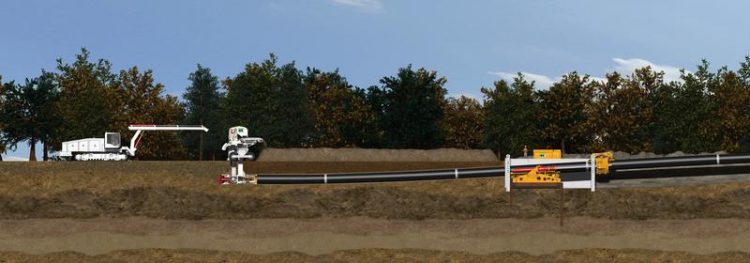Laying pipelines in a more environmentally friendly manner

The operator vehicle controls and monitors the system. The excavator unit loosens the ground and conveys it directly to the surface. © Herrenknecht AG
The near-surface installation of pipelines usually causes massive disturbance to the environment. It can create corridors up to 50 metres wide. The BINE Projektinfo brochure “Swift construction of pipelines” (04/2014) presents a method that requires less than one fifth of the usual width. The steel or concrete pipes can be used for heating networks and can connect more distant customers faster and in a more environmentally friendly manner.
Until now, corridors often more than 50 metres in width have been created along the entire length of pipeline routes for digging trenches, temporarily storing soil, as well as transporting and storing materials. Despite reclamation work, the consequences for the environment are still visible even after years. The Pipe Express method eliminates the need for complicated trench excavation work. Since this reduces the effort required for renaturisation measures, costs can be saved.
With the Pipe Express method, a tunnel boring machine drills through the ground. An excavation unit loosens the soil and transfers it to the surface. An anchored thrust element (pipe thruster) provides the necessary jacking. It simultaneously pushes the pipeline into the horizontally generated bore hole. The driver in the operator vehicle monitors and controls the system along the pipeline. Pipelines laid in this manner can be used for transferring district heating, communications and data cables, power cables, oil, gas and water. In future, the Pipe Express method could play a greater role in integrating geothermal power plants into the heat supply for urban settlements.
The Pipe Express process was developed by Herrenknecht AG and has been sponsored with funding from the German Federal Ministry for the Environment.
The BINE-projectinfobrochure, which can be obtained free of charge from the BINE Information Service at FIZ Karlsruhe, is available online at www.bine.info or by calling +49 (0)228 92379-0.
Press contact
Uwe Milles
presse(at)bine.info
About BINE Information Service
Energy research for practical applications
The BINE Information Service reports on energy research topics, such as new materials, systems and components, as well as innovative concepts and methods. The knowledge gained is incorporated into the implementation of new technologies in practice, because first-rate information provides a basis for pioneering decisions, whether in the planning of energy-optimised buildings, increasing the efficiency of industrial processes, or integrating renewable energy sources into existing systems.
About FIZ Karlsruhe
FIZ Karlsruhe – Leibniz Institute for Information Infrastructure is a not-for-profit organization with the public mission to make sci-tech information from all over the world publicly available and to provide related services in order to support the national and international transfer of knowledge and the promotion of innovation.
Our business areas:
• STN International – the world’s leading online service for research and patent information in science and technology
• KnowEsis – innovative eScience solutions to support the process of research in all its stages, and throughout all scientific disciplines
• Databases and Information Services – Databases and science portals in mathematics, computer science, crystallography, chemistry, and energy technology
FIZ Karlsruhe is a member of the Leibniz Association (WGL) which consists of 87 German research and infrastructure institutions.
http://www.bine.info/en/press/press-releases/press/pressemitteilung/rohrleitunge… – Download cover, press release and info-pdf
http://www.bine.info/en – BINE Informationsdienst english
Media Contact
All latest news from the category: Architecture and Construction
Newest articles

NASA: Mystery of life’s handedness deepens
The mystery of why life uses molecules with specific orientations has deepened with a NASA-funded discovery that RNA — a key molecule thought to have potentially held the instructions for…

What are the effects of historic lithium mining on water quality?
Study reveals low levels of common contaminants but high levels of other elements in waters associated with an abandoned lithium mine. Lithium ore and mining waste from a historic lithium…

Quantum-inspired design boosts efficiency of heat-to-electricity conversion
Rice engineers take unconventional route to improving thermophotovoltaic systems. Researchers at Rice University have found a new way to improve a key element of thermophotovoltaic (TPV) systems, which convert heat…



